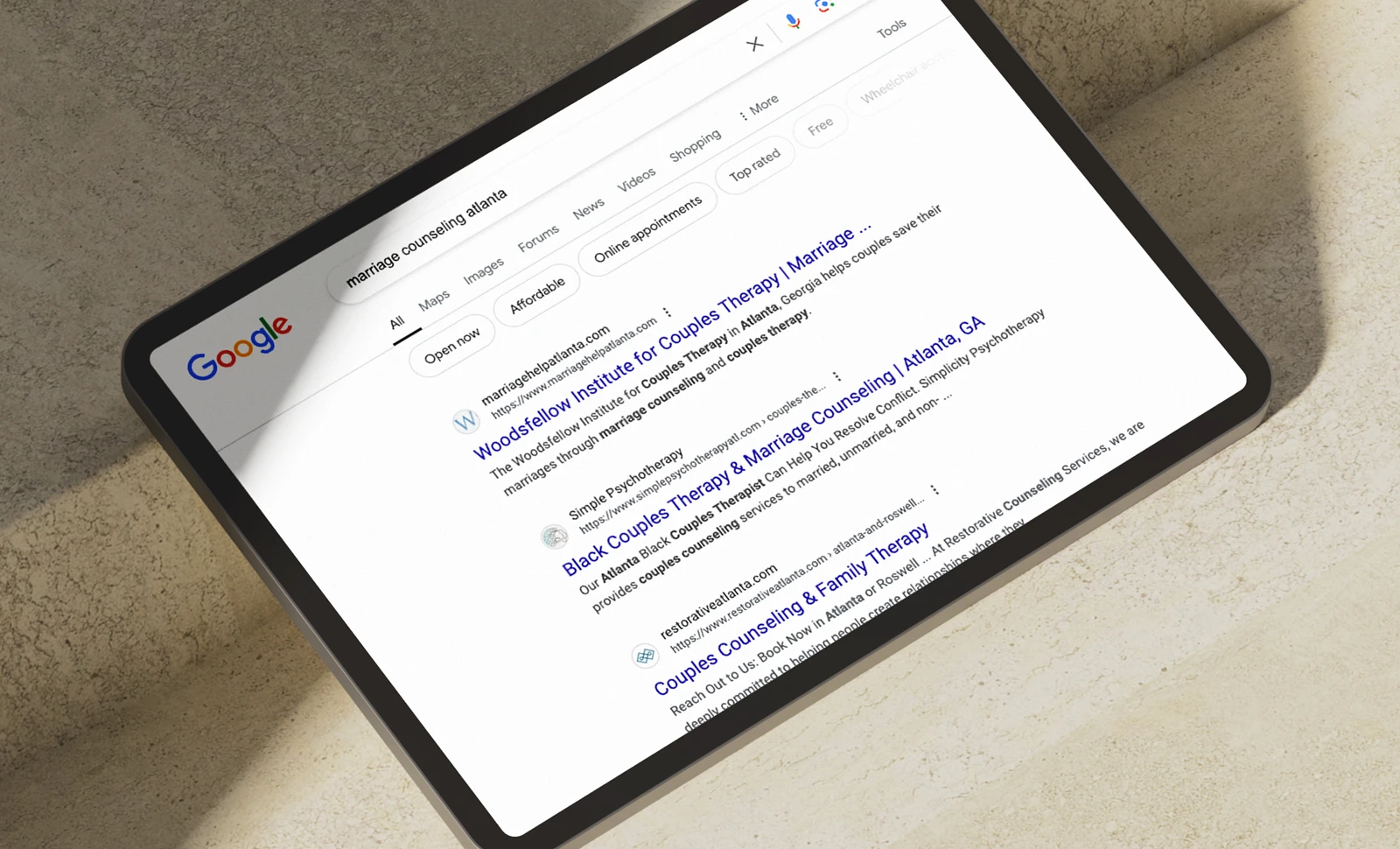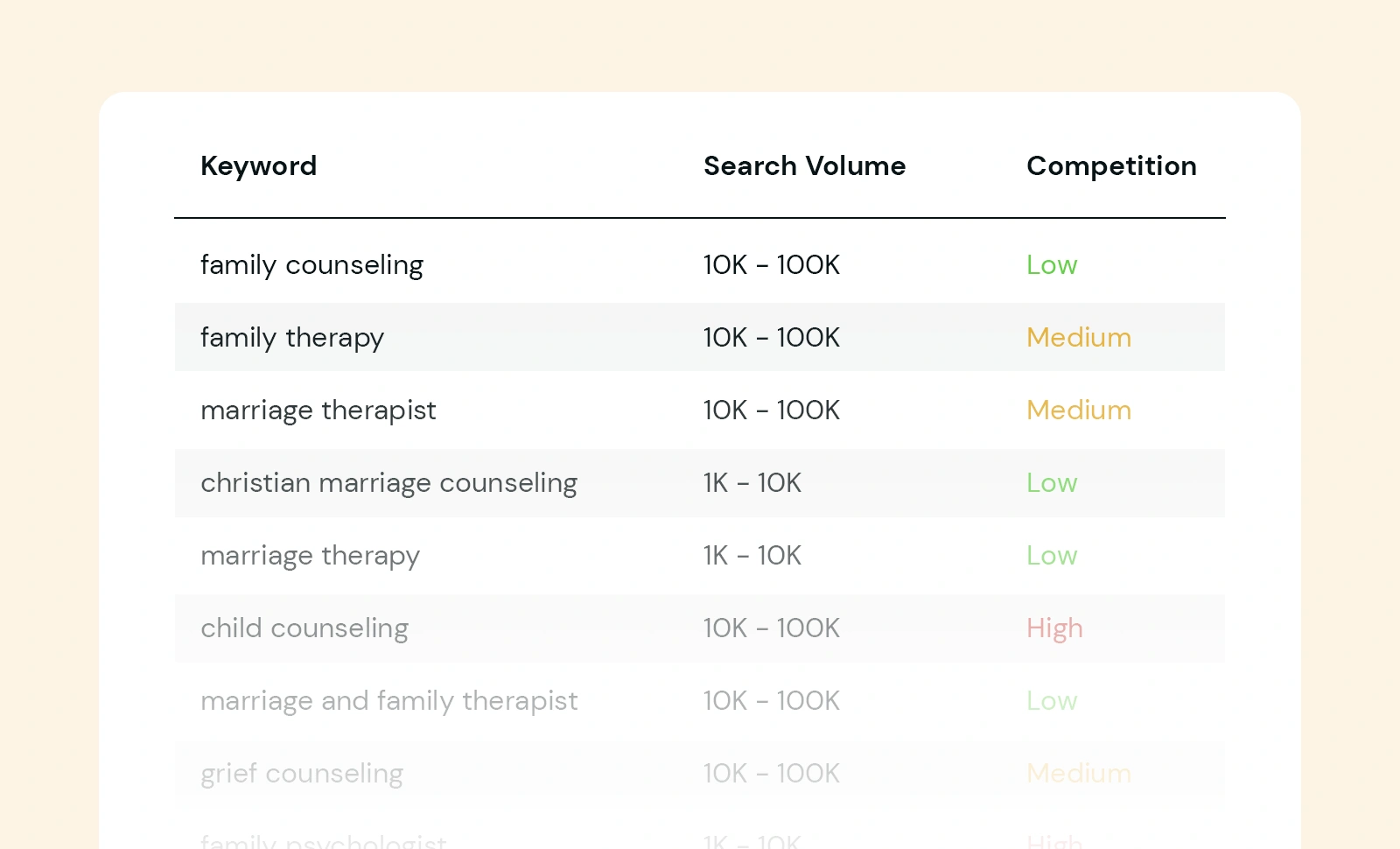You’ve likely heard a lot of noise and opinions about Search Engine Optimization (“SEO”), which has left you overwhelmed. You know it’s important but the steps to take action are unclear. No worries, we got you! In this article, we will help you understand and implement basic SEO strategies to enhance your online visibility.
The tips outlined below are all lovingly baked into every website we build at Session Sites (and then some) but SEO for therapists can easily be applied to any platform out there.
Understanding SEO and Its Importance for Therapists
Let’s start with a baseline, plain English definition of SEO. Search Engine Optimization encompasses the efforts taken to appease the Google gods so they shine on your website in a favorable light.
As you skim through this blog post about SEO for therapists, you’ll notice we exclusively refer to Google. Yes, there are a few other popular search engines but they share less than 10% of the market collectively. Make Google happy and the rest (Bing, Yahoo, etc.) will follow.
What is SEO?
If a client is searching for a therapist, the order of results they see on Google is determined by several factors and signals. Truth be told, the search giant is a bit secretive about the inner workings of its ever-changing algorithm but they’re very clear about general best practices to abide by.
When it comes to boosting your practice’s search engine ranking, these factors fall into one of two categories: on-page and off-page SEO. The former refers to the content and structure of your actual website while the latter is all about links from other domains to your site (“backlinks”).
Backlinks, citations, social media and age of domain all influence Google’s measurement of your website’s importance and relevance but, for today, let’s focus on what we can control—our own website.

Why SEO Matters for Therapists
SEO can increase visibility, attract potential clients and establish credibility for your practice. You already know traffic to your website is the goal. The more visitors you can obtain organically, the less you have to spend on advertising.
Last time you were looking for shoes or a handyman or an Italian restaurant in your city, I’m willing to bet you didn’t drill down to page five of the results. Most people don’t—that’s why ranking high is such a coveted position for any private practice AND why SEO for therapists is so important.
While kind-hearted therapists don’t see other local clinicians as “competitors” per say, under the lens of SEO, they are. Taking even minimal steps to improve your website’s SEO can be the difference between your next ideal-fit client finding YOU or clicking with a colleague.
Keyword Research: Finding the Right Terms
Google is not a human—it’s a robot that scans your website for keywords to determine what it’s all about. You cannot call Google, nor can you invite it for coffee to explain in-person your experience and specialties. The text you place on your therapy website is the single most impactful way to make sure these lifeless bots understand your practice.
You can’t be expected to perform an exhaustive keyword research project while running a business and serving your clients. SEO for therapists is a rabbit hole you don’t have time to go down. So let’s make this easy…
What the Heck are Keywords?
Keywords are the words, phrases, or queries people type into search engines when they’re looking for therapy. Websites with content that matches those keywords are in prime position to appear in those results.
Serving relevant results to users is Google’s #1 priority. Effective SEO for therapists is about being relevant in Google’s eyes.
Identifying Relevant Keywords
At Session Sites, our philosophy is that content should be written for humans while offering clarity to robots.
We’ve all visited websites with wild headlines all over the place like, “Welcome to Best Plumber Springfield Clogged Pipes American Hot Dog Affordable” but this is transparently keyword stuffing. Search engines are smarter than that (and customers find it off-putting and inauthentic).
Keyword ranking should never come at the sacrifice of connecting with your visitors. SEO for therapists is all about finding that perfect harmony between the two.
Choosing the Right Keywords
Make a short list of search terms you’d like your practice to appear for and tie them into your website as much as possible (without going overboard). Some pro tips for identifying relevant keywords:
- Lead with plain English
SEO for therapists means taking off your training hat. Forget the fancy scientific terms you learned in your master’s program. Think about what a potential client might type into Google. - Put yourself in the client’s shoes
Most clients seeking a therapist have not yet been diagnosed. Therefore, they are likely searching by personal experience, feelings, or symptoms. For instance, consider “obsessed with food” instead of “bulimia nervosa.” - Embrace your niche
Oh how nice it would be if SEO for therapists were as easy as placing the word “therapy” on your website and watching the traffic come in droves. Therapy, however, is a broad term and you will likely never rank for it on its own. Instead, utilize the specialties that make your practice unique. Whether it’s the LGBTQ community or divorced dads, speak to them specifically throughout your content. - Think local
Most therapists are licensed to practice in just one state. While it certainly doesn’t hurt to have visitors from other parts of the country, local traffic leads to booked calls. Use your location throughout the website to help Google serve you up to people in your area.
If you really wanna take your keyword research to the next level, there are plenty of SEO tools to help put some data and strategy behind your efforts. For most therapists, this overkill. Those who take that extra step might just have a leg up on the competition!

On-Page SEO Essentials
As we mentioned earlier, on-page SEO is the effort you make throughout your therapy website to help Google better understand your practice. This is the part of SEO therapists can actually control—so let’s not leave these opportunities unchecked.
Optimizing Your Website Content
Remember we discussed developing a list of keywords relevant to your private practice? Now we need to ensure those phrases are prevalent in the following places:
- Page Titles
- Headings (H1, H2, H3, H4)
- Body Text
- Image ALT Tags and Titles
- META Descriptions
Choose one primary keyword to focus on with each page and blog post. For instance, the key phrase for this article is SEO for Therapists. And look, you’re here!
Creating High-Quality Content
Writing for humans while appeasing Google’s minions is more art than science. Again, we don’t want our site to read like nonsense to potential clients just for the sake of an easy SEO boost.
Write engaging, informative, keyword-rich content on your website and in your blog. The word count matters much less than the quality of the messaging. Let your personality shine through in the text. People and search bots alike all appreciate authenticity.
This might also be a good time to mention Blogs. You may be thinking, “I’m bad at writing” or “nobody will read my blog” or “I have nothing original to say” but this is one of the most effective ways to expand your footprint on Google. Not to mention, blog posts are a great vehicle for shy clients to get to know you before making the decision to reach out.
Text is boring and people don’t read. Be sure to sprinkle in some photos, graphics, icons, charts, quotes and videos to break things up. This rich mix of media will also help with your SEO score.
Improving Website Structure
Depending on which platform you use to build your website, you’ll have at least some control over its architecture.
When search engine bots are zipping through our site in a matter of milliseconds, we don’t want them to hit any dead ends. That’s why Google rewards those who embrace:
- Intuitive navigation principles
- Links to relevant internal content on other pages and posts
- Clean URL structures (/services instead of /page-id=123)
- Simplicity in layout & design
- Consistent fonts & styles
- Mobile-friendly templates
- Fast page load speeds
What’s great about improving the structure of your website for search engines is it ALSO improves the experience for your visitors. Happy visitors means more appointments booked!
“The future of SEO is not link building. The future of SEO is great user experience. That means sites with good quality content, media, etc. will tend to rank better over a longer period of time.”
Neil Patel
Technical SEO Basics
We could geek out over the technical side of SEO all day because this is our world. However, you have a practice to run and clients to serve so let’s keep things simple:
- Responsive Website Design
Google knows if your website is optimized for tablets and mobile devices. In fact, they insist on it! - Site Speed & Performance
Search engines aren’t going to display links to sites that load slow and are likely to frustrate users. A faster website can be achieved by hosting in the cloud, using next-gen image formats and minimizing the bloat of your code. - Security
Your hosting provider should provide your domain with an SSL certificate. Maybe you’ve noticed some URL’s start with https while others are still http. Nobody wants to visit a website that isn’t secure these days.
It’s worth noting that the impact of optimizations you make to your site cannot usually be seen immediately. We are at the mercy of Google crawling the site at their leisure. SEO for therapists (or anyone) can sometimes take a few weeks or a few months to produce results. Patience and persistence are key!
Where to Begin
You don’t have to be a coding wizard or hire an SEO professional to boost the organic reach of your private practice website. Simply being aware of what search engines are looking for and taking small steps to satisfy those factors can improve your ranking exponentially.
These efforts cost you nothing and could easily transform your client pipeline—increasing your website’s traffic while decreasing ad spend.
No matter where you live or what your speciality is, a therapist’s objective is universal; to provide the right resources to the right people. SEO for therapists means the next client who needs you can find you.

